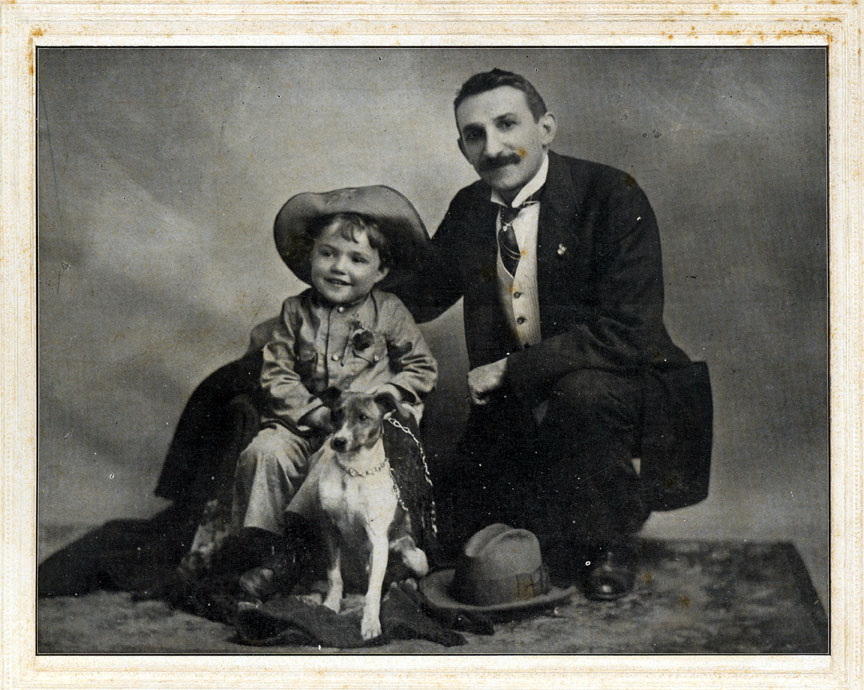“Poor old father!” declared The Asheville Citizen in a July 14, 1910, editorial. “Heretofore he has been kicked and cuffed from pillar to post; run out of the house when ‘there was anything doing in the social line,’ and generally relegated to the back stairs as a useful but not ornamental piece of furniture.”
Change, however, was in the air. According to the editorial, dads across the country were finally getting their due with the launch of Father’s Day. First observed in Spokane, Wash., the 1910 observance arrived two years after the country’s inaugural Mother’s Day celebration (see “Asheville Archives: Mother’s Day arrives in the mountains,” May 12, Xpress).
News of this latest marking generated local and national discussion about the role of fatherhood. “Daddy used to be represented as all sorts of a bad ’un, with an ineradicable tendency to spend his wages instead of taking them dutifully home on Saturday night,” wrote Thomas Shelby in a national column featured in the July 31, 1910, edition of The Sunday Citizen.
Father’s Day signified a change in the popular narrative, Shelby argued. “No longer is [dad] to be numbered among the despised of the earth,” the columnist proclaimed. “Why, he is to have even a day of his own — the third Sunday of every June.”
Yet, Shelby insisted, a critical question remained: Did fathers want such recognition? The writer implored men across the nation to speak on the matter. “Would a word of loving praise for you be amiss once a year, or would you prefer that your efforts pass unnoticed and unrewarded save by the approval of your own consciences?” the columnist asked.
In Asheville, the official answer arrived two years later, when the city celebrated its first Father’s Day on June 16, 1912. Red roses were worn as a symbol of respect to all living fathers; meanwhile, white roses were adorned to honor those departed.
In that day’s edition of The Sunday Citizen, the paper proclaimed:
“[A]ll good and dutiful children will today devote their efforts to remembering the many good things that father has done for them and try to obtain a different view point of the one that they now mostly regard as an animated bank account or a free lunch meal-ticket.”
The influx of these two new national holidays appears to have inspired local satire. On June 23, 1912, The Sunday Citizen informed readers that “one of the leading young bachelors of the city,” was advocating for and helping spearhead the next national day of observance: Mother-in-Law Day. Adoring sons-in-law were to sport sunflowers on Sunday, June 30, in honor of their mothers-in-law, the paper wrote.
Beyond sunflowers, the majority of the holiday would require sons-in-law to contemplate the virtues of these women in isolation, the article continued. For this reason, the paper declared, “it has been decided that the proper observance of the day would be a fishing trip, in some secluded spot with plenty of ‘bait,’ and plenty of room for the fishermen to express himself freely of all that is in his heart regarding his mother-in-law.”
According to the article, the young men leading the movement believed the day would “go down in history as far more important than either of the other two [holidays],” the paper proclaimed.
Sunday, June 30, 1912, passed without pageantry. The headline in the following day’s paper read: “Mother-in-Law’s Day is dismal failure.”
According to the article:
“It was with deep regret and bursting hearts that the young men who started the movement strolled over [to] the city yesterday and saw that their labor had been lost, and that not a sunflower was in evidence. One of them, a single man who has never possessed a mother-in-law, was moved to tears as he stood near the postoffce and saw no evidence of the celebration of the day held sacred to mothers-in-law.
“’Flowers, flowers everywhere, and not a sunflower in sight,’ he exclaimed sadly, as he leaned up against the post and watched the hurrying throngs. ‘Some day these hard hearted, unfeeling people will realize what a glorious chance they have missed to immortalize Asheville, and will shed bitter tears of regret.’”
Editor’s note: Peculiarities of spelling and punctuation are preserved from the original documents.




Before you comment
The comments section is here to provide a platform for civil dialogue on the issues we face together as a local community. Xpress is committed to offering this platform for all voices, but when the tone of the discussion gets nasty or strays off topic, we believe many people choose not to participate. Xpress editors are determined to moderate comments to ensure a constructive interchange is maintained. All comments judged not to be in keeping with the spirit of civil discourse will be removed and repeat violators will be banned. See here for our terms of service. Thank you for being part of this effort to promote respectful discussion.